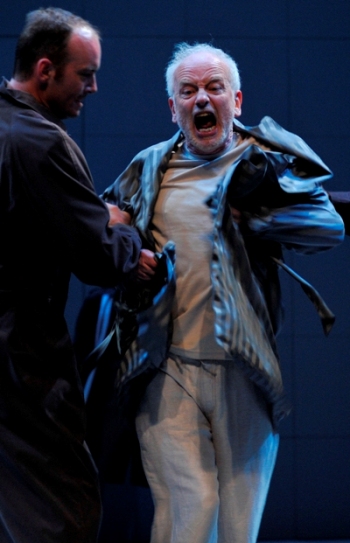Chicago Shakespeare’s lean and brisk ‘Timon’ zooms in on crash-and-burn of a needy Midas
 Review: “Timon of Athens” by William Shakespeare, at Chicago Shakespeare Theater through June 10. ****
Review: “Timon of Athens” by William Shakespeare, at Chicago Shakespeare Theater through June 10. ****
By Lawrence B. Johnson
What we conventionally refer to as Shakespeare’s “Timon of Athens” is a fascinating albeit problematic play, a bizarre, rather loosely knit tragedy co-written with Thomas Middleton. With an eye to tightening and sharpening this uneven work, Chicago Shakespeare Theatre has streamlined “Timon” to a degree that indeed quickens its pace, though at some cost to the play’s original shape and fullness.
 While scholars are divided on where exactly “Timon of Athens” falls in the chronology of Shakespeare’s plays, there’s general agreement that it comes fairly late, probably around the time of “King Lear.”
While scholars are divided on where exactly “Timon of Athens” falls in the chronology of Shakespeare’s plays, there’s general agreement that it comes fairly late, probably around the time of “King Lear.”
Timon’s estrangement, and his reaction to it, closely resembles that of King Lear as he loses his self-esteem, his place in the world, his very sense of self. Like Lear’s fall, Timon’s is largely self-inflicted through a combination of poor judgment and sheer hubris. And like the dispossessed, storm-tossed king, the beleaguered Timon plunges into an abyss of irrationality.
If Chicago Shakespeare’s production, directed by Barbara Gaines, plays fast and loose with the Shakespeare-Middleton text, its adjustments leave Timon vividly framed in his native state of misanthropy veering into madness. In his final extremity, Gaines shows us Timon quite au naturel – sans friends, sans hope, sans everything. The bearer of this burden of nothingness is the Scottish actor Ian McDiarmid, and he invests poor Timon with a nihilism worthy of his malice.
 How Timon, once the fabulously wealthy toast of Athens, tumbles so low – a hermit digging for the nourishment of roots in a woods – is the tale of a needy Midas. Through boundless largesse, Timon surrounds himself with a grand circle of sycophants. When the money runs out and debts pile up, Timon turns confidently to his well-provided friends for relief. They all turn him down. His disbelief shifts to fury, and after reviling them all, he seeks refuge in the woods where, with any luck, he will never have to look upon another man.
How Timon, once the fabulously wealthy toast of Athens, tumbles so low – a hermit digging for the nourishment of roots in a woods – is the tale of a needy Midas. Through boundless largesse, Timon surrounds himself with a grand circle of sycophants. When the money runs out and debts pile up, Timon turns confidently to his well-provided friends for relief. They all turn him down. His disbelief shifts to fury, and after reviling them all, he seeks refuge in the woods where, with any luck, he will never have to look upon another man.
But fate throws Timon a curve: While digging for roots, he unearths a vast cache of gold. Word of this spreads and as his fair-weather friends begin to seek him out, Timon again lavishes his means on them all – with the bidding that they use it to corrupt the world and, having done that, hang themselves.
McDiarmid’s Timon makes a tragic passage indeed, from hale fellow, all cheer and generosity, to elemental rage and a general loathing, the first object of which is himself. It is the thorough viciousness of Timon’s misanthropy that McDiarmid carries off so well, starting with the curse he hurls upon Athens and the whole human lot. After Timon resettles in the woods, McDiarmid flings more edged, ironic harangues – generally ascribed to Shakespeare — at the gold-digging visitors to his retreat.
 The strength of McDiarmid’s performance also underscores the chief weakness inherent in the play: that Timon is the only character of much substance in it, with the qualified exceptions of his skeptical friend Apemantus (the dryly needling James Newcomb) and the disillusioned military commander Alcibiades (in a credible meltdown by Danforth Comins). All the rest are character types – or, more accurately, variations on the self-interested false friend. Even Timon’s estate manager Flavius, played with appealing earnestness and despair by Sean Fortunato, is little more than a dramatic device.
The strength of McDiarmid’s performance also underscores the chief weakness inherent in the play: that Timon is the only character of much substance in it, with the qualified exceptions of his skeptical friend Apemantus (the dryly needling James Newcomb) and the disillusioned military commander Alcibiades (in a credible meltdown by Danforth Comins). All the rest are character types – or, more accurately, variations on the self-interested false friend. Even Timon’s estate manager Flavius, played with appealing earnestness and despair by Sean Fortunato, is little more than a dramatic device.
Well, I might amend that last bit concerning Flavius in the present instance, though my spoiler flag forbids me to say why. Let’s just say that although “Timon” hardly qualifies as a cautionary tale, one is left with the sense that great wealth can stain the best of souls, and director Barbara Gaines drives that point home with her last hammer blow.
For what it is, it’s an effective production, but there’s a bit too much let’s-get-on-with-it haste in Gaines’ edits. Where Timon sends word of need to three of his friends, Gaines has trimmed away the appeals as if they were so much fat, leaving only the lean responses, which though appalling enough lose something of their real dastardliness without the setups.
More cavalier is the director’s whacking and reworking of the visitations in the woods, where speeches from one completely banished scene are transferred – however plausibly – to another. While one might argue that no harm is done, and one of Timon’s recycled harangues has been mercifully expunged, they’re all delightful diatribes and I for one would rather hear McDiarmid deliver the batch.
What works extremely well is Gaines’ relocation of the play from antiquity to the present day, with all the cleverly utilized accessories of cell phones (news flashes), video displays (stock reports) and military modernisms. That last brings me to Lindsay Jones’ high-powered soundscape augmented by his incisive original music; and I loved the brutal riff on Tchaikovsky’s “Swan Lake” when a covey of black swans come to entertain chez Timon.
Kevin Depinet’s sparely appointed sets – Timon’s minimalist dining room in the first part, his bleak sand pile in the second – allow free range for the actors and our imaginations. This is a play about imagination, distorted and illusory, where all the world’s an asylum and Timon its leading actor.
Related Links:
- McDiarmid speaks about the character Timon: Read it at Chicago On the Aisle
- A different production of “Timon of Athens” will be performed in London this summer during the Cultural Olympiad: Click here for details
- “Timon of Athens” was last produced on Broadway in 1993 starring Brian Bedford: See production details
- Read or download Shakespeare’s text: Go to Project Gutenberg
- Performance location, dates and times: Details at TheatreinChicago.com
Photo captions and credits: Home page: Timon’s wealth and largesse have made him larger than life. Descending: Ever the generous host, Timon (Ian McDiarmid) toasts his adoring friends. As his disconsolate estate manager Flavius (Sean Fortunato, right) looks on, Timon lets the good times roll. Suddenly swamped by debt, Timon (Ian McDiarmid) rails at a creditor. Timon (Ian McDiarmid) withdraws to a wilderness to nurture his bitterness. Fortune’s ticker-tape brings bad news to Timon (Ian McDiarmid). (Photos by Liz Lauren)
Tags: "Timon of Athens", Barbara Gaines, Chicago Shakespeare Theater, Danforth Comins, Ian McDiarmid, James Newcomb, Kevin Depinet, Lindsay Jones, Sean Fortunato, Shakespeare, Thomas Middleton


